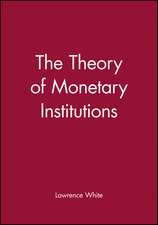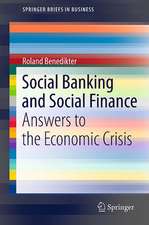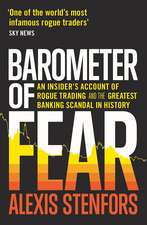Decision Taking, Confidence and Risk Management in Banks from Early Modernity to the 20th Century: Palgrave Studies in the History of Finance
Editat de Korinna Schönhärlen Limba Engleză Hardback – 6 feb 2017
This book offers 14 contributions that examine key questions in bank decision-taking,
constitution of confidence in banks and risk management practices from Early Modernity to the twentieth century. It explores how the various mechanisms of bank decision taking changed over time. Chapters also analyse the types of risk management techniques used, the contributory factors to the constitution of confidence and the methods that banking historians can use to analyse and describe bankers´ risk management and decision taking - from system theory tobehavioural finance, new institutional economics to praxeology and convention theory to network analysis. The different methodological approaches are put to the test in case studies based on archive material from four hundred years of banking in order to connect banking history more closely to political and cultural history.
| Toate formatele și edițiile | Preț | Express |
|---|---|---|
| Paperback (1) | 1108.51 lei 43-57 zile | |
| Springer International Publishing – 15 iul 2018 | 1108.51 lei 43-57 zile | |
| Hardback (1) | 1113.09 lei 43-57 zile | |
| Springer International Publishing – 6 feb 2017 | 1113.09 lei 43-57 zile |
Din seria Palgrave Studies in the History of Finance
-
 Preț: 362.11 lei
Preț: 362.11 lei - 9%
 Preț: 764.94 lei
Preț: 764.94 lei - 9%
 Preț: 626.30 lei
Preț: 626.30 lei - 18%
 Preț: 737.26 lei
Preț: 737.26 lei - 15%
 Preț: 522.89 lei
Preț: 522.89 lei -
 Preț: 451.65 lei
Preț: 451.65 lei - 15%
 Preț: 701.06 lei
Preț: 701.06 lei - 18%
 Preț: 726.37 lei
Preț: 726.37 lei - 15%
 Preț: 712.22 lei
Preț: 712.22 lei - 15%
 Preț: 530.25 lei
Preț: 530.25 lei - 18%
 Preț: 1114.21 lei
Preț: 1114.21 lei - 18%
 Preț: 1006.55 lei
Preț: 1006.55 lei - 18%
 Preț: 726.06 lei
Preț: 726.06 lei - 18%
 Preț: 786.84 lei
Preț: 786.84 lei - 18%
 Preț: 792.03 lei
Preț: 792.03 lei - 18%
 Preț: 724.94 lei
Preț: 724.94 lei - 15%
 Preț: 702.54 lei
Preț: 702.54 lei - 18%
 Preț: 723.69 lei
Preț: 723.69 lei -
 Preț: 388.72 lei
Preț: 388.72 lei - 15%
 Preț: 694.19 lei
Preț: 694.19 lei - 18%
 Preț: 782.72 lei
Preț: 782.72 lei - 15%
 Preț: 637.59 lei
Preț: 637.59 lei - 18%
 Preț: 1108.51 lei
Preț: 1108.51 lei - 9%
 Preț: 920.31 lei
Preț: 920.31 lei - 15%
 Preț: 711.89 lei
Preț: 711.89 lei -
 Preț: 383.12 lei
Preț: 383.12 lei - 18%
 Preț: 891.33 lei
Preț: 891.33 lei - 18%
 Preț: 958.25 lei
Preț: 958.25 lei - 18%
 Preț: 1008.28 lei
Preț: 1008.28 lei -
 Preț: 445.88 lei
Preț: 445.88 lei - 18%
 Preț: 1113.58 lei
Preț: 1113.58 lei - 15%
 Preț: 646.75 lei
Preț: 646.75 lei - 15%
 Preț: 702.05 lei
Preț: 702.05 lei -
 Preț: 450.11 lei
Preț: 450.11 lei - 18%
 Preț: 794.39 lei
Preț: 794.39 lei - 18%
 Preț: 948.29 lei
Preț: 948.29 lei - 15%
 Preț: 697.97 lei
Preț: 697.97 lei - 18%
 Preț: 728.74 lei
Preț: 728.74 lei
Preț: 1113.09 lei
Preț vechi: 1357.43 lei
-18% Nou
Puncte Express: 1670
Preț estimativ în valută:
213.06€ • 231.51$ • 179.08£
213.06€ • 231.51$ • 179.08£
Carte tipărită la comandă
Livrare economică 21 aprilie-05 mai
Preluare comenzi: 021 569.72.76
Specificații
ISBN-13: 9783319420752
ISBN-10: 3319420755
Pagini: 259
Ilustrații: XIX, 342 p. 6 illus., 1 illus. in color.
Dimensiuni: 148 x 210 x 24 mm
Greutate: 0.57 kg
Ediția:1st ed. 2017
Editura: Springer International Publishing
Colecția Palgrave Macmillan
Seria Palgrave Studies in the History of Finance
Locul publicării:Cham, Switzerland
ISBN-10: 3319420755
Pagini: 259
Ilustrații: XIX, 342 p. 6 illus., 1 illus. in color.
Dimensiuni: 148 x 210 x 24 mm
Greutate: 0.57 kg
Ediția:1st ed. 2017
Editura: Springer International Publishing
Colecția Palgrave Macmillan
Seria Palgrave Studies in the History of Finance
Locul publicării:Cham, Switzerland
Cuprins
Chapter 1) Introduction; Korinna Schönhärl.- Part 1: Recruitment of Personnel and Partners.- Chapter 2) The House of Morgan: Private family bank in transition; Susie J Pak.- Chapter 3) Cooperative Governance in Banking: Consequences for decision-taking processes; Friederike Sattler.- Chapter 4) Top Careers as a Means of Risk Management in Organisations; Daniel Wylegala.- Part 2) Risk Management Techniques.- Chapter 5) Minimizing Risk: Financial intermediaries and bond issuing in London before the Great War; Anders l Mikkelsen.- Chapter 6) Financial Centres as Fields: Reflections on habitus and risk in the nineteenth and twentieth centuries.- Chapter 7) The “Reputation Approach” and the Justificatory Function of Economic Calculation: Some Critical Reflections on Monika Pohle Fraser’s Analysis of Risk Management Techniques in the Nineteenth Century; Sebastian Knake.- Chapter 8) Investigating Attitudes to risk in British Banking: A case study of Barclays’ branch banking system, c. 1900-80; Matthew Hollow.- Chapter 9) Between novelty and fashion – Risk management and the adoption of computers in retail banking; Bernardo Bátiz-Lazo.- Part 3: Methodological Tools for Historians: Network-Theory, Principal-Agent-Relationship, Behavioural Finance and Social Capital.- Chapter 10) Social capital versus commercial profits: The pressure of networks on decision making in early modern banks; Nadia Matringe.- Chapter 11) Risk management, credit and the operation of merchants’ networks in early modern banking; Daniel Velinov.- Chapter 12) The role of group psychology in behavioural finance: A research starting point for banking, economic and financial historians; Victor Ricciardi.- Chapter 13) Behavioural finance as a methodological approach for historians? A field report concerning the construction of the Canal of Corinth in nineteenth-century Greece; Korinna Schönhärl.- Chapter 14) Considering social capital and the future research of banking history; Morten Reitmayer.
Notă biografică
Korinna Schönhärl is Assistant Professor for Social and Economic History at Essen University, Germany. Her current research centres on the investment of European banks in Greece in the19th century. Additional research foci are historical methodology, the history of economic thought, the history of migration and the history of tax morale.
Textul de pe ultima copertă
This book offers 14 contributions that examine key questions in bank decision-taking,
constitution of confidence in banks and risk management practices from Early Modernity to the twentieth century. It explores how the various mechanisms of bank decision taking changed over time. Chapters also analyse the types of risk management techniques used, the contributory factors to the constitution of confidence and the methods that banking historians can use to analyse and describe bankers´ risk management and decision taking - from system theory to behavioural finance, new institutional economics to praxeology and convention theory to network analysis. The different methodological approaches are put to the test in case studies based on archive material from four hundred years of banking in order to connect banking history more closely to political and cultural history.
Caracteristici
Presents new methodological approaches in practical historical research Combines theory with empirical evidence Leverages concepts from behavioural finance















